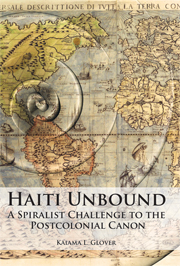Book contents
- Frontmatter
- Contents
- Acknowledgements
- Preface
- Part I Introduction: The Consequences of Ex-Centricity
- Part II Shifty/Shifting Characters
- 1 Beings Without Borders
- 2 Zombies Become Warriors
- 3 Productive Schizophrenia
- Part III Space-Time of the Spiral
- Part IV Showing vs. Telling
- Part V Conclusions: No Lack of Language
- Works Cited
- Index
3 - Productive Schizophrenia
from Part II - Shifty/Shifting Characters
- Frontmatter
- Contents
- Acknowledgements
- Preface
- Part I Introduction: The Consequences of Ex-Centricity
- Part II Shifty/Shifting Characters
- 1 Beings Without Borders
- 2 Zombies Become Warriors
- 3 Productive Schizophrenia
- Part III Space-Time of the Spiral
- Part IV Showing vs. Telling
- Part V Conclusions: No Lack of Language
- Works Cited
- Index
Summary
Les Possédés de la pleine lune, Aube Tranquille and Le Peuple des terres mêlées
Because our deepest Self escapes us, the demands of History have created in the Caribbean region a schizophrenic personality that at once suffers and rejoices in creation … Celebrating ourselves as beings to be divided. Divided beings. Different. Installed in difference, without any real chance of establishing coherence (temptation and difficulty characteristic of schizophrenics) …
—Jean-Claude FignoléWhere Frankétienne makes use of the zombie, both literal and metaphorical, to emphasize the fundamentally dual and often conflicted essence of his characters, Jean-Claude Fignolé and René Philoctète might be said to have embraced schizophrenia as a principal configurative point of departure. Though perhaps less directly issued from Haiti's popular culture, the schizophrenia presented in the Spiralists' works strikes individuals who exist and struggle with/in a contextual space that is decidedly Haitian. At the same time, however, Fignolé and Philoctète explore the potential of the Haitian folkloric universe to provide insight into non-Haitian-specific problematics. Expanding on the model created by Frankétienne's first prose works, Fignolé and Philoctète offer characters whose personal sufferings echo those of the Haitian nation and, to some extent, of the (post)modern world as a whole. Their characters' schizophrenic responses to the tragedies in their lives are portrayed as much more than mere pessimistic neuroses. Rather, their schizoid behaviors very often provide opportunities for self-interrogation and even self-preservation.
- Type
- Chapter
- Information
- Haiti UnboundA Spiralist Challenge to the Postcolonial Canon, pp. 72 - 100Publisher: Liverpool University PressPrint publication year: 2010

